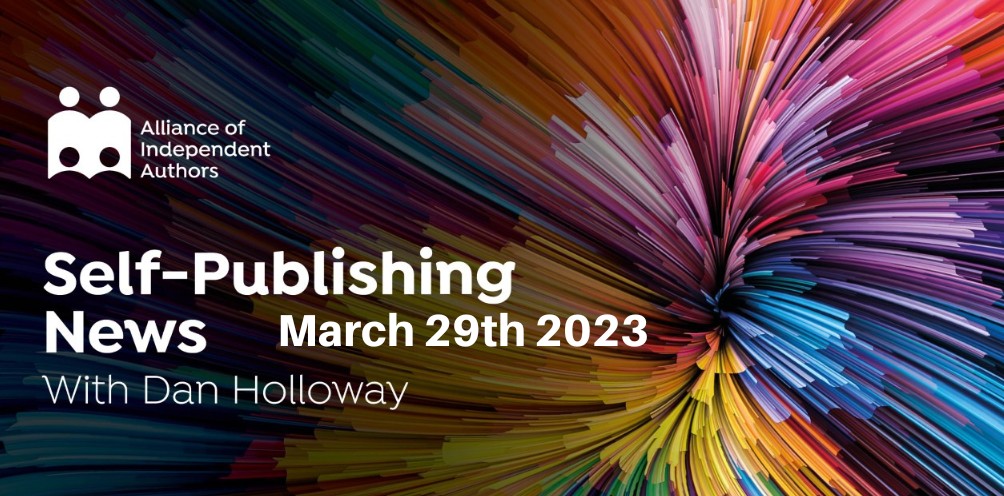In this week's Self-Publishing News Special, ALLi News Editor Dan Holloway takes a look at the shortlists for this year's Selfies Awards.

ALLi's News Editor Dan Holloway
In this month's podcast, Howard and I discuss the US Copyright Office's new guidance on the use of AI-generated materials in creative works, and ALLi's indie author income survey.
Celebrating Indie Author Awards Success
I love celebrating indie success more than I love sharing doom and gloom about how AI is stealing our futures. There seems to have been a lot of both of late. But this week I am delighted that the emphasis is well and truly on the former.
2023 Selfies Awards
The Selfies, winners of which will be announced at next month’s London Book Fair, are the leading awards dedicated to indie authors. So the shortlist is always a celebration of our community. But it’s also really pleasing that ALLi members are always so well represented on the shortlists, going right back to the first winner, Jane Davis, when there was just one open category.
The Selfies now have three categories: adult fiction, children’s fiction, and autobiography/memoir. This year's shortlists are a celebration of some fantastic books (and authors)
Very best wishes to all the authors. A particular shout to ALLi members Jane Davis, Glyn Harper, Jean Gill, Karen Inglis, Kirstie Watson, and Sarah Ziegel.
The Nibbies
The British Book Awards, or Nibbies, is one of the big dates in the awards diary. It’s an absolute joy to be able to report that indie pioneer L J Ross has been shortlisted for this year’s awards. Ross’ Bamburgh is on the shortlist for Book of the Year in the Crime and Thriller category. I wish her all the very best and hope to report with good news in May.
Copyright: Ruling Against Internet Archive's Open Library
There may be no AI this week, but the big news from last week continues to rumble on. Libraries found themselves on the wrong end of the newly created Protect the Creative economy coalition last week. This week one particular library, Internet Archive’s Open Library, finds itself on the receiving end of a definitive ruling of breaching the Copyright Act through its practice of “controlled digital lending.” The prosecution goes back to 2020, despite a brief lull in hostilities during the pandemic when publishers seemed to accept that any breach of the Act might not be bad in all cases at all times.
Controlled Digital Lending
Controlled digital lending is the term Open Library uses to justify its distribution of ebooks. And by distribution of ebooks, I mean taking a physically printed book, copying it electronically, and then lending out that copy. The “controlled” part of “controlled digital lending” refers to the fact that Open Library will only lend out one copy of the book at a time. That means it will lend a digital copy only if the physical copy has not already been loaned.
The Copyright Act has been at the centre of recent arguments. The campaign against bills seeking to grant libraries rights to access ebooks on “reasonable terms” focuses on preserving the protection that the Act affords creators. And the case against Open Library rests on the same piece of legislation. Internet Archive argues that its controlled digital lending practice amounts to fair use under the Copyright Act. Publishers argued that it amounts to illegally creating and distributing ebooks. The judgement in this case came within days. Passive Guy, who is an intellectual property lawyer by day job, concludes this means , “it was a slam-dunk case.” Publishers have, needless to say, warmly welcomed the ruling.
One of the things that has struck me in writing this report is the similarity with the Audible Captions fiasco. The issue there was that Audible claimed to be offering captions in addition to their audiobooks as an accessibility aide. Publishers claimed this was a cover for a rights grab. The rights in question being for ebooks, which publishers had not granted Audible when they granted them audio rights. Audible, of course, backtracked. If they hadn't, it would have been interesting to see how the threatened legal action would have proceeded given the Open Library case.
I have, as always, tried to report informatively to tell you what you need to know. (However much I might be more outspoken elsewhere). Our campaigns manager, Melissa, whose job it is to take a much less neutral approach holds nothing back in her assessment:
“Given that ebooks exist and that all authors would be more than willing to have their ebooks available in libraries in return for an appropriately set and managed lending fee, it seems willfully anti-author to set up the kind of arrangement that the Open Library had. How are authors expected to earn a living if organizations who ought to know better are setting up a system which denies them a reasonable payment? We are delighted to hear of the ruling, of course, but neither the Open Library ebooks nor the Audible Captions approaches should ever have been set up in the first place. Organizations need to stop undermining authors' rights to proper payment for their creative works.” Melissa Addey, Campaigns Manager for ALLi.
ALLi Ambassador on Woman's Hour on Thursday March 30
Continuing the theme of high profile for indies is some great media representation. ALLi ambassador Julia Boggio will be on Woman's Hour this Thursday, March 30, at 10 am British Summer Time. Woman's Hour is one of the highest profile programmes on UK radio, a daily feature of morning life on Radio 4 for many decades. It will be fantastic to hear her repping indie authors on such a great platform. She will be talking about her new novel, Shooters.
Self-publishing News: Celebrating Indie Awards Success Share on X



